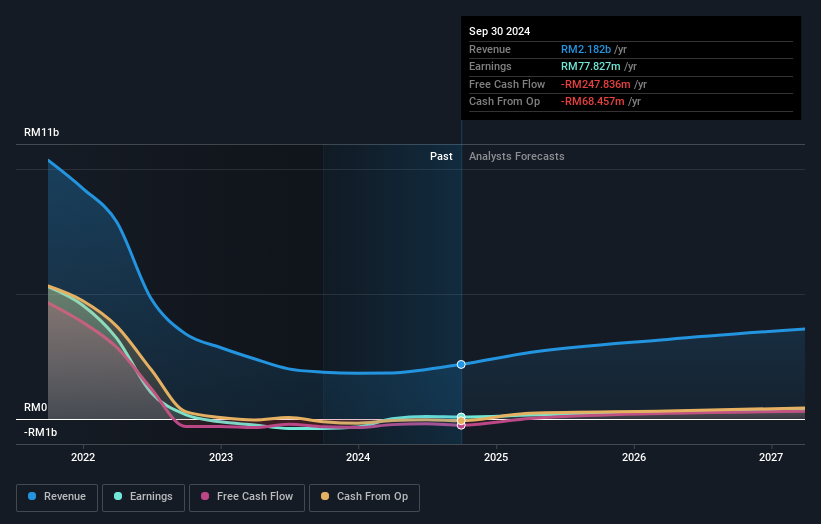- Malaysia
- /
- Medical Equipment
- /
- KLSE:HARTA
Hartalega Holdings Berhad's (KLSE:HARTA three-year decrease in earnings delivers investors with a 30% loss

While not a mind-blowing move, it is good to see that the Hartalega Holdings Berhad (KLSE:HARTA) share price has gained 21% in the last three months. But that cannot eclipse the less-than-impressive returns over the last three years. In fact, the share price is down 36% in the last three years, falling well short of the market return.
Given the past week has been tough on shareholders, let's investigate the fundamentals and see what we can learn.
See our latest analysis for Hartalega Holdings Berhad
There is no denying that markets are sometimes efficient, but prices do not always reflect underlying business performance. One flawed but reasonable way to assess how sentiment around a company has changed is to compare the earnings per share (EPS) with the share price.
Hartalega Holdings Berhad became profitable within the last five years. We would usually expect to see the share price rise as a result. So given the share price is down it's worth checking some other metrics too.
With a rather small yield of just 0.3% we doubt that the stock's share price is based on its dividend. Arguably the revenue decline of 66% per year has people thinking Hartalega Holdings Berhad is shrinking. After all, if revenue keeps shrinking, it may be difficult to find earnings growth in the future.
The image below shows how earnings and revenue have tracked over time (if you click on the image you can see greater detail).

It's probably worth noting that the CEO is paid less than the median at similar sized companies. It's always worth keeping an eye on CEO pay, but a more important question is whether the company will grow earnings throughout the years. So it makes a lot of sense to check out what analysts think Hartalega Holdings Berhad will earn in the future (free profit forecasts).
What About Dividends?
It is important to consider the total shareholder return, as well as the share price return, for any given stock. The TSR is a return calculation that accounts for the value of cash dividends (assuming that any dividend received was reinvested) and the calculated value of any discounted capital raisings and spin-offs. So for companies that pay a generous dividend, the TSR is often a lot higher than the share price return. In the case of Hartalega Holdings Berhad, it has a TSR of -30% for the last 3 years. That exceeds its share price return that we previously mentioned. And there's no prize for guessing that the dividend payments largely explain the divergence!
A Different Perspective
It's good to see that Hartalega Holdings Berhad has rewarded shareholders with a total shareholder return of 31% in the last twelve months. And that does include the dividend. There's no doubt those recent returns are much better than the TSR loss of 3% per year over five years. The long term loss makes us cautious, but the short term TSR gain certainly hints at a brighter future. Shareholders might want to examine this detailed historical graph of past earnings, revenue and cash flow.
If you like to buy stocks alongside management, then you might just love this free list of companies. (Hint: many of them are unnoticed AND have attractive valuation).
Please note, the market returns quoted in this article reflect the market weighted average returns of stocks that currently trade on Malaysian exchanges.
Valuation is complex, but we're here to simplify it.
Discover if Hartalega Holdings Berhad might be undervalued or overvalued with our detailed analysis, featuring fair value estimates, potential risks, dividends, insider trades, and its financial condition.
Access Free AnalysisHave feedback on this article? Concerned about the content? Get in touch with us directly. Alternatively, email editorial-team (at) simplywallst.com.
This article by Simply Wall St is general in nature. We provide commentary based on historical data and analyst forecasts only using an unbiased methodology and our articles are not intended to be financial advice. It does not constitute a recommendation to buy or sell any stock, and does not take account of your objectives, or your financial situation. We aim to bring you long-term focused analysis driven by fundamental data. Note that our analysis may not factor in the latest price-sensitive company announcements or qualitative material. Simply Wall St has no position in any stocks mentioned.
About KLSE:HARTA
Hartalega Holdings Berhad
An investment holding company, engages in the manufacture, retail, and wholesale of latex and nitrile gloves in Malaysia, North America, Europe, rest of Asia, Australia, South America, and the Middle East.
Flawless balance sheet with reasonable growth potential.
Market Insights
Community Narratives




